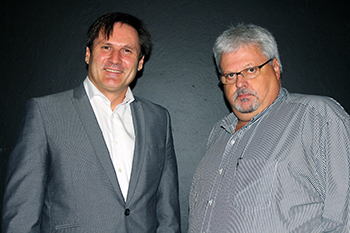Latest News Archive
Please select Category, Year, and then Month to display items
26 July 2022
|
Story Bulelwa Moikwatlhai
|
Photo Supplied
 Experiencing the UFS in person for the first time are from the left: Sandor Potjer (VU Amsterdam), Bulelwa Moikwatlhai (UFS OIA), Ricarda Kochems (Bremen University, Germany), Froukje Pronk (VU Amsterdam) and Matome Mokoena (UFS OIA)
Experiencing the UFS in person for the first time are from the left: Sandor Potjer (VU Amsterdam), Bulelwa Moikwatlhai (UFS OIA), Ricarda Kochems (Bremen University, Germany), Froukje Pronk (VU Amsterdam) and Matome Mokoena (UFS OIA)
As the UFS COVID-19 Regulations and Required Vaccination Policy has been lifted with immediate effect – allowing 100% capacity of both students and staff members and a fully operational campus – the
Office for International Affairs welcomes its first physical exchange cohort after two years. The cohort of students hail from the various international partners of the UFS, namely the
University of Bremen in Germany, the Vrije Universiteit Amsterdam, and Sciences PO Bordeaux in France. The students will be hosted in the UFS faculties of the Humanities, Economic and Management Sciences, and Natural and Agricultural Sciences, respectively.
These students have been paired with
Umoja Buddy Programme ambassadors to help ensure their smooth transition and integration into student life at the UFS. Furthermore, the students received an invitation from the President of the
International Student Association (ISA), Courtney Madziwa, to join their association, thus exposing them to students from other countries to learn about the various cultures.
On 18 July, the Office for International Affairs (OIA) arranged a hybrid orientation programme for the exchange students, including those students who have not yet arrived on the Bloemfontein Campus. The students took part in an icebreaker activity, where they had the opportunity to learn from and teach other participants about their home countries. Dr Cornelius Hagenmeier, Director of the OIA, welcomed the exchange students to the Bloemfontein Campus, and expressed excitement to have physical exchanges again. Furthermore, the guest presenters ranged from student leadership, staff members, and service providers.
The presentations were practical, demonstrating, among others, how to create a password on the institutional website – presented by Mr Molemo Mohapi from UFS ICT. The presentation on how to fully utilise Blackboard was facilitated by Ms Vuthihi Mudau from the UFS CTL division. We take the safety of all our students seriously, so Ms Elise Oberholzer from the UFS Protection Services has given the students some tips on how to safeguard themselves.
Internationally-renowned futurist proposes innovation in corporate management
2016-05-10

Pieter Geldenhuys, guest speaker at the seminar, who mapped the future of corporate management (left) with Dr Vic Coetzee, Senior Director: Information and Communication Technology Services at the UFS (right).
Photo: Hatsu Mphatsoe
|
Humans need to adapt their thinking to the world’s changes. This is Pieter Geldenhuys’s conviction.
The Information and Communication Technology Services (ICT) at the University of the Free State hosted a seminar on 22 April 2016 at the Bloemfontein Campus. Geldenhuys, the Director of the Institute for Technology Strategy and Innovation at North-West University and internationally-renowned futurist, presented his views on technology, innovation, and corporate management on this occasion.
Geldenhuys, a well- known speaker, academic, and futurist, is in the business of identifying opportunities in the changing technological and social landscape with the aim of assisting companies to prepare for the future, while being an active agent in defining it. Lately, he has been exploring the concept of a new kind of management science, which he believes is a prerequisite for institutions such as ours.
This management science incorporates physics in improving corporate management. “We have an unbelievable grasp of the world of physics,” he said, suggesting that we use our knowledge of nature to capitalise on individual and collective strengths within institutions.
He said that minor changes can change one’s future or that of an organisation completely. He even went as far as to state that the culture of an organisation is the one that determines how well you do. Relating to the adaption of organisations in a constantly changing and dynamic environment, Geldenhuys advised that, “when faced with disruption, don’t retaliate; accept.”
By making use of different tools, such as technology aw well as social and business trends, Geldenhuys is adamant that corporations and institutions will adapt easily to the world’s complex systems.